Leadership and Management for Service Industries (GB)
VerifiedAdded on 2023/06/17
|14
|3958
|236
AI Summary
This report analyses the key challenges and obstacles managers and leaders face in sustainable hospitality management. It reviews classical management theories and leadership styles used in the hospitality industry. It identifies and reviews a sustainable management and leadership style at The Langham Hotel, comprising issues related to sustainable leadership within the hospitality industry. It investigates various internal and external factors that influence sustainable leadership and assesses the existing and future management and leadership hard and soft skills at The Langham Hotel.
Contribute Materials
Your contribution can guide someone’s learning journey. Share your
documents today.
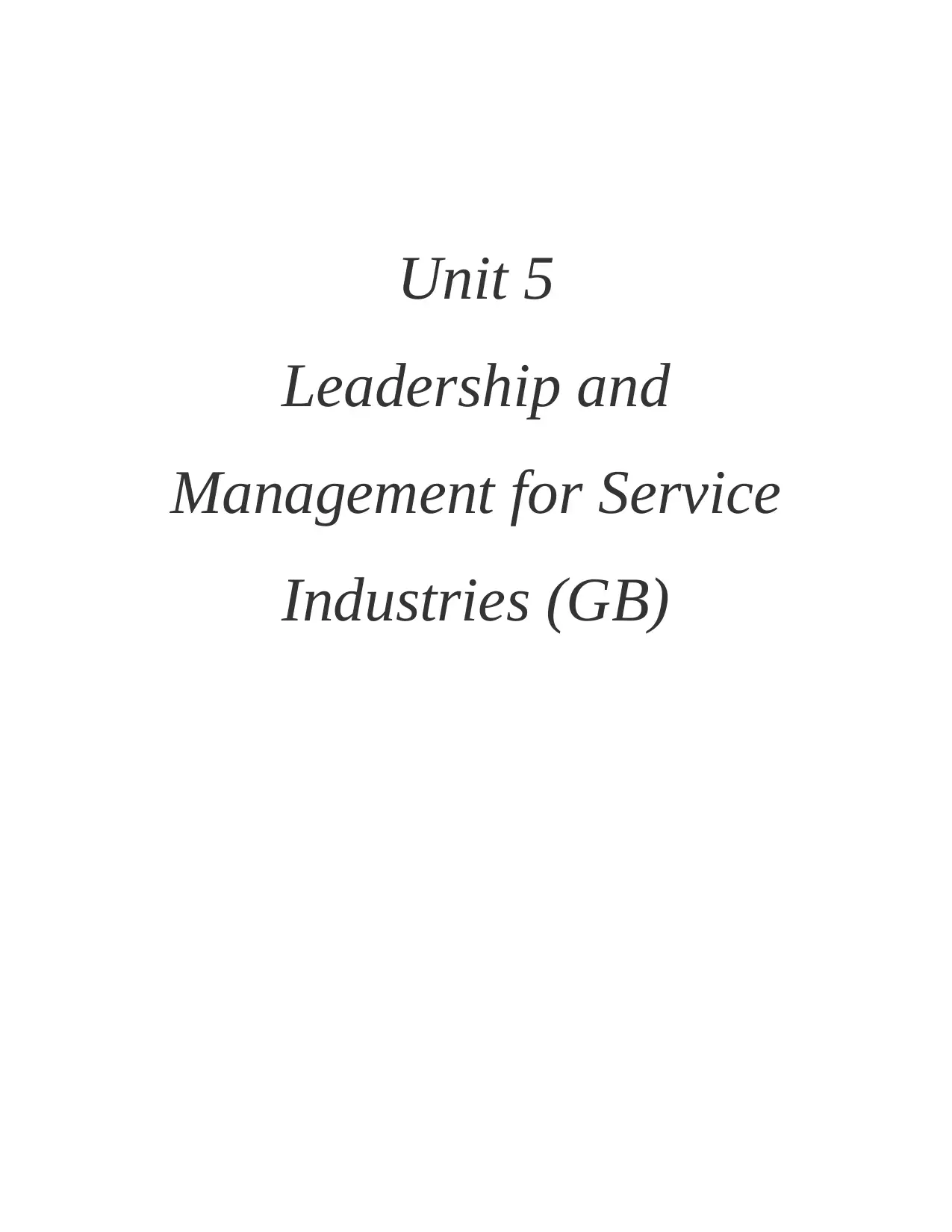
Unit 5
Leadership and
Management for Service
Industries (GB)
Leadership and
Management for Service
Industries (GB)
Secure Best Marks with AI Grader
Need help grading? Try our AI Grader for instant feedback on your assignments.
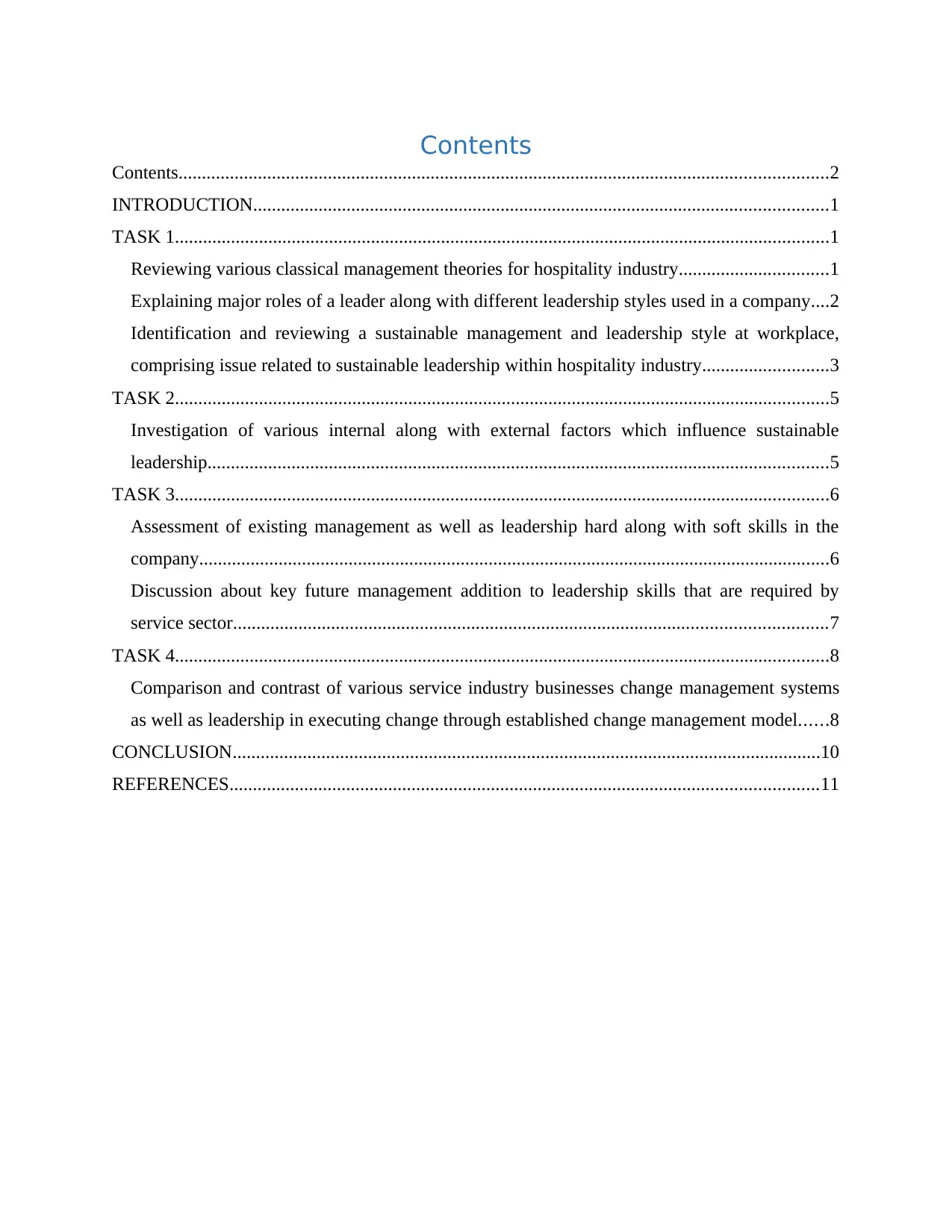
Contents
Contents...........................................................................................................................................2
INTRODUCTION...........................................................................................................................1
TASK 1............................................................................................................................................1
Reviewing various classical management theories for hospitality industry................................1
Explaining major roles of a leader along with different leadership styles used in a company....2
Identification and reviewing a sustainable management and leadership style at workplace,
comprising issue related to sustainable leadership within hospitality industry...........................3
TASK 2............................................................................................................................................5
Investigation of various internal along with external factors which influence sustainable
leadership.....................................................................................................................................5
TASK 3............................................................................................................................................6
Assessment of existing management as well as leadership hard along with soft skills in the
company.......................................................................................................................................6
Discussion about key future management addition to leadership skills that are required by
service sector...............................................................................................................................7
TASK 4............................................................................................................................................8
Comparison and contrast of various service industry businesses change management systems
as well as leadership in executing change through established change management model......8
CONCLUSION..............................................................................................................................10
REFERENCES..............................................................................................................................11
Contents...........................................................................................................................................2
INTRODUCTION...........................................................................................................................1
TASK 1............................................................................................................................................1
Reviewing various classical management theories for hospitality industry................................1
Explaining major roles of a leader along with different leadership styles used in a company....2
Identification and reviewing a sustainable management and leadership style at workplace,
comprising issue related to sustainable leadership within hospitality industry...........................3
TASK 2............................................................................................................................................5
Investigation of various internal along with external factors which influence sustainable
leadership.....................................................................................................................................5
TASK 3............................................................................................................................................6
Assessment of existing management as well as leadership hard along with soft skills in the
company.......................................................................................................................................6
Discussion about key future management addition to leadership skills that are required by
service sector...............................................................................................................................7
TASK 4............................................................................................................................................8
Comparison and contrast of various service industry businesses change management systems
as well as leadership in executing change through established change management model......8
CONCLUSION..............................................................................................................................10
REFERENCES..............................................................................................................................11

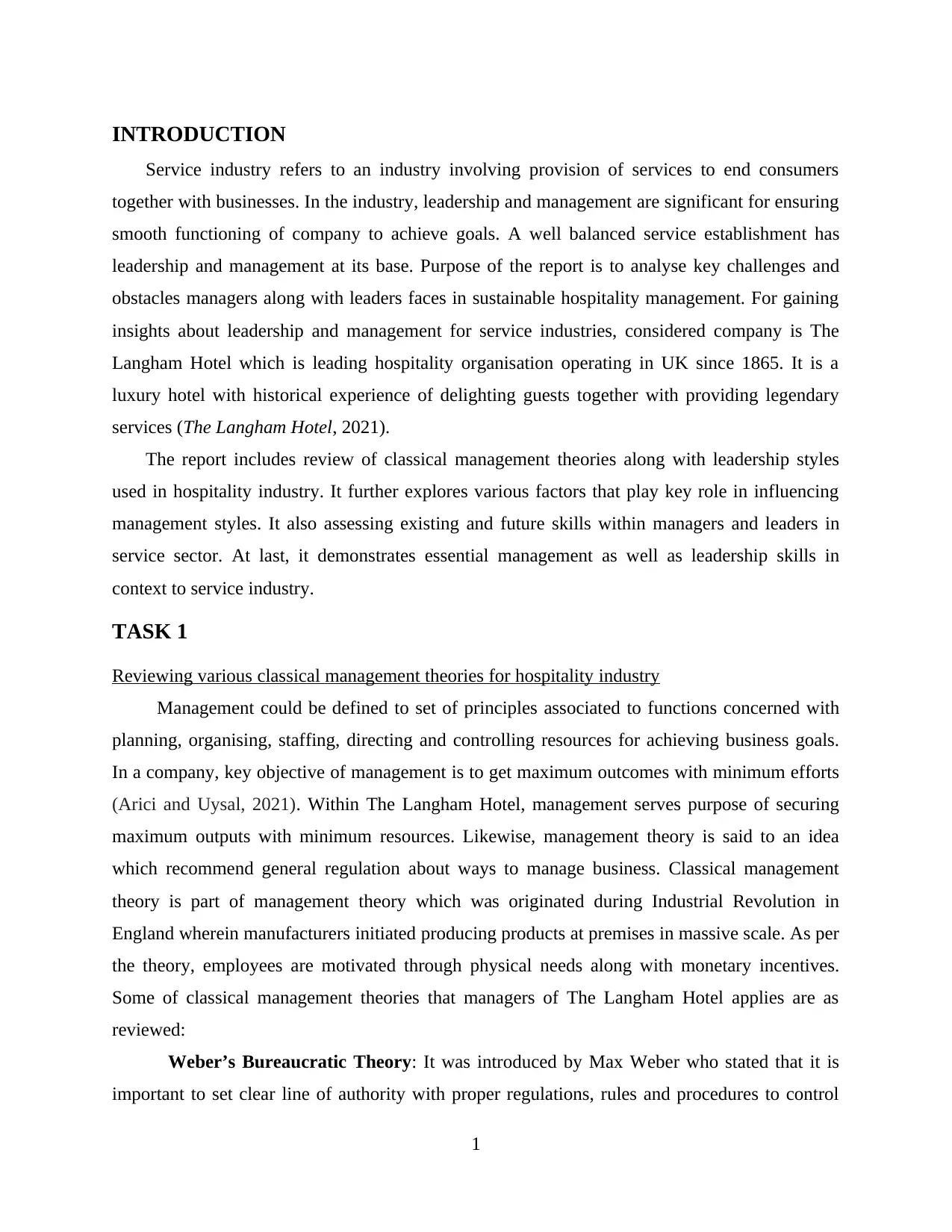
INTRODUCTION
Service industry refers to an industry involving provision of services to end consumers
together with businesses. In the industry, leadership and management are significant for ensuring
smooth functioning of company to achieve goals. A well balanced service establishment has
leadership and management at its base. Purpose of the report is to analyse key challenges and
obstacles managers along with leaders faces in sustainable hospitality management. For gaining
insights about leadership and management for service industries, considered company is The
Langham Hotel which is leading hospitality organisation operating in UK since 1865. It is a
luxury hotel with historical experience of delighting guests together with providing legendary
services (The Langham Hotel, 2021).
The report includes review of classical management theories along with leadership styles
used in hospitality industry. It further explores various factors that play key role in influencing
management styles. It also assessing existing and future skills within managers and leaders in
service sector. At last, it demonstrates essential management as well as leadership skills in
context to service industry.
TASK 1
Reviewing various classical management theories for hospitality industry
Management could be defined to set of principles associated to functions concerned with
planning, organising, staffing, directing and controlling resources for achieving business goals.
In a company, key objective of management is to get maximum outcomes with minimum efforts
(Arici and Uysal, 2021). Within The Langham Hotel, management serves purpose of securing
maximum outputs with minimum resources. Likewise, management theory is said to an idea
which recommend general regulation about ways to manage business. Classical management
theory is part of management theory which was originated during Industrial Revolution in
England wherein manufacturers initiated producing products at premises in massive scale. As per
the theory, employees are motivated through physical needs along with monetary incentives.
Some of classical management theories that managers of The Langham Hotel applies are as
reviewed:
Weber’s Bureaucratic Theory: It was introduced by Max Weber who stated that it is
important to set clear line of authority with proper regulations, rules and procedures to control
1
Service industry refers to an industry involving provision of services to end consumers
together with businesses. In the industry, leadership and management are significant for ensuring
smooth functioning of company to achieve goals. A well balanced service establishment has
leadership and management at its base. Purpose of the report is to analyse key challenges and
obstacles managers along with leaders faces in sustainable hospitality management. For gaining
insights about leadership and management for service industries, considered company is The
Langham Hotel which is leading hospitality organisation operating in UK since 1865. It is a
luxury hotel with historical experience of delighting guests together with providing legendary
services (The Langham Hotel, 2021).
The report includes review of classical management theories along with leadership styles
used in hospitality industry. It further explores various factors that play key role in influencing
management styles. It also assessing existing and future skills within managers and leaders in
service sector. At last, it demonstrates essential management as well as leadership skills in
context to service industry.
TASK 1
Reviewing various classical management theories for hospitality industry
Management could be defined to set of principles associated to functions concerned with
planning, organising, staffing, directing and controlling resources for achieving business goals.
In a company, key objective of management is to get maximum outcomes with minimum efforts
(Arici and Uysal, 2021). Within The Langham Hotel, management serves purpose of securing
maximum outputs with minimum resources. Likewise, management theory is said to an idea
which recommend general regulation about ways to manage business. Classical management
theory is part of management theory which was originated during Industrial Revolution in
England wherein manufacturers initiated producing products at premises in massive scale. As per
the theory, employees are motivated through physical needs along with monetary incentives.
Some of classical management theories that managers of The Langham Hotel applies are as
reviewed:
Weber’s Bureaucratic Theory: It was introduced by Max Weber who stated that it is
important to set clear line of authority with proper regulations, rules and procedures to control
1
Secure Best Marks with AI Grader
Need help grading? Try our AI Grader for instant feedback on your assignments.
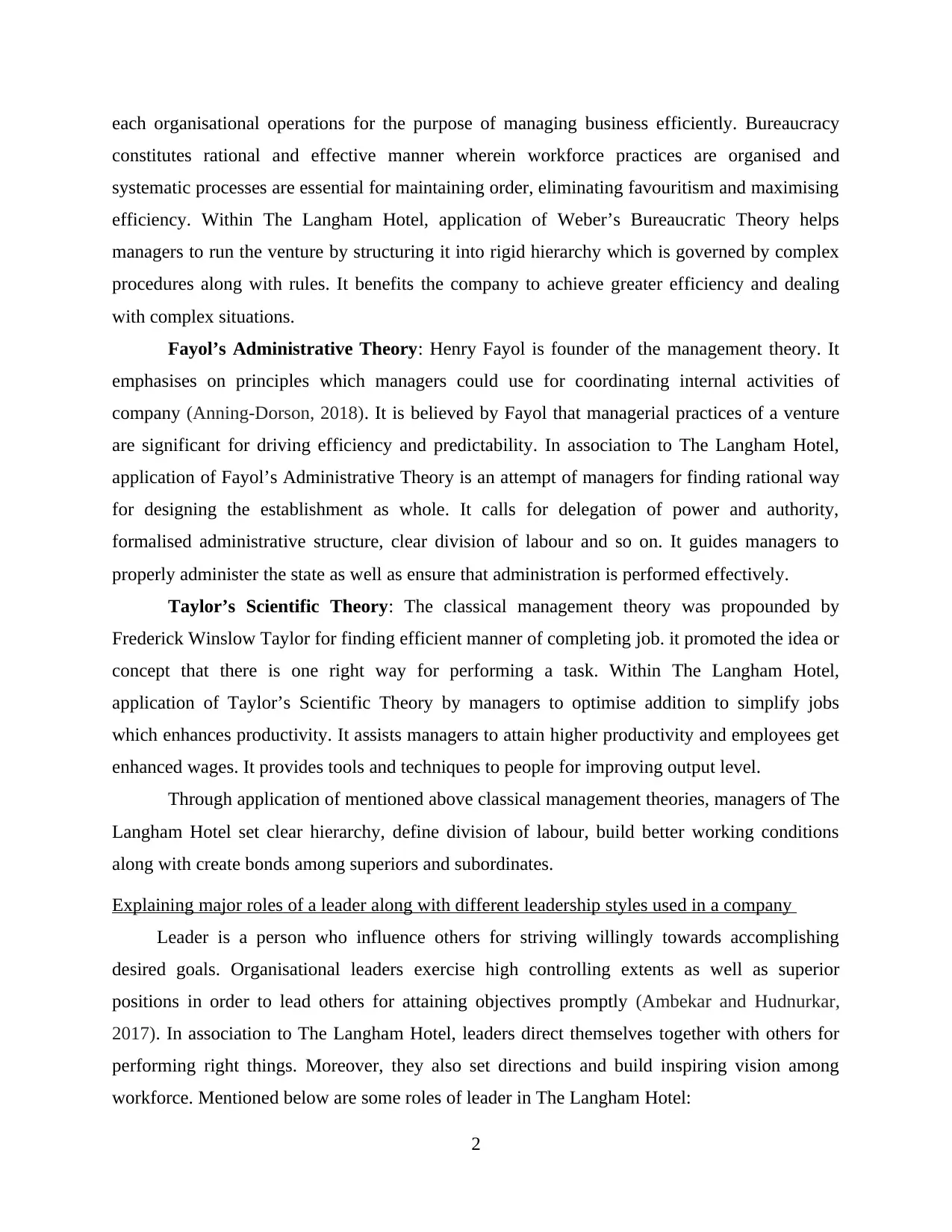
each organisational operations for the purpose of managing business efficiently. Bureaucracy
constitutes rational and effective manner wherein workforce practices are organised and
systematic processes are essential for maintaining order, eliminating favouritism and maximising
efficiency. Within The Langham Hotel, application of Weber’s Bureaucratic Theory helps
managers to run the venture by structuring it into rigid hierarchy which is governed by complex
procedures along with rules. It benefits the company to achieve greater efficiency and dealing
with complex situations.
Fayol’s Administrative Theory: Henry Fayol is founder of the management theory. It
emphasises on principles which managers could use for coordinating internal activities of
company (Anning-Dorson, 2018). It is believed by Fayol that managerial practices of a venture
are significant for driving efficiency and predictability. In association to The Langham Hotel,
application of Fayol’s Administrative Theory is an attempt of managers for finding rational way
for designing the establishment as whole. It calls for delegation of power and authority,
formalised administrative structure, clear division of labour and so on. It guides managers to
properly administer the state as well as ensure that administration is performed effectively.
Taylor’s Scientific Theory: The classical management theory was propounded by
Frederick Winslow Taylor for finding efficient manner of completing job. it promoted the idea or
concept that there is one right way for performing a task. Within The Langham Hotel,
application of Taylor’s Scientific Theory by managers to optimise addition to simplify jobs
which enhances productivity. It assists managers to attain higher productivity and employees get
enhanced wages. It provides tools and techniques to people for improving output level.
Through application of mentioned above classical management theories, managers of The
Langham Hotel set clear hierarchy, define division of labour, build better working conditions
along with create bonds among superiors and subordinates.
Explaining major roles of a leader along with different leadership styles used in a company
Leader is a person who influence others for striving willingly towards accomplishing
desired goals. Organisational leaders exercise high controlling extents as well as superior
positions in order to lead others for attaining objectives promptly (Ambekar and Hudnurkar,
2017). In association to The Langham Hotel, leaders direct themselves together with others for
performing right things. Moreover, they also set directions and build inspiring vision among
workforce. Mentioned below are some roles of leader in The Langham Hotel:
2
constitutes rational and effective manner wherein workforce practices are organised and
systematic processes are essential for maintaining order, eliminating favouritism and maximising
efficiency. Within The Langham Hotel, application of Weber’s Bureaucratic Theory helps
managers to run the venture by structuring it into rigid hierarchy which is governed by complex
procedures along with rules. It benefits the company to achieve greater efficiency and dealing
with complex situations.
Fayol’s Administrative Theory: Henry Fayol is founder of the management theory. It
emphasises on principles which managers could use for coordinating internal activities of
company (Anning-Dorson, 2018). It is believed by Fayol that managerial practices of a venture
are significant for driving efficiency and predictability. In association to The Langham Hotel,
application of Fayol’s Administrative Theory is an attempt of managers for finding rational way
for designing the establishment as whole. It calls for delegation of power and authority,
formalised administrative structure, clear division of labour and so on. It guides managers to
properly administer the state as well as ensure that administration is performed effectively.
Taylor’s Scientific Theory: The classical management theory was propounded by
Frederick Winslow Taylor for finding efficient manner of completing job. it promoted the idea or
concept that there is one right way for performing a task. Within The Langham Hotel,
application of Taylor’s Scientific Theory by managers to optimise addition to simplify jobs
which enhances productivity. It assists managers to attain higher productivity and employees get
enhanced wages. It provides tools and techniques to people for improving output level.
Through application of mentioned above classical management theories, managers of The
Langham Hotel set clear hierarchy, define division of labour, build better working conditions
along with create bonds among superiors and subordinates.
Explaining major roles of a leader along with different leadership styles used in a company
Leader is a person who influence others for striving willingly towards accomplishing
desired goals. Organisational leaders exercise high controlling extents as well as superior
positions in order to lead others for attaining objectives promptly (Ambekar and Hudnurkar,
2017). In association to The Langham Hotel, leaders direct themselves together with others for
performing right things. Moreover, they also set directions and build inspiring vision among
workforce. Mentioned below are some roles of leader in The Langham Hotel:
2
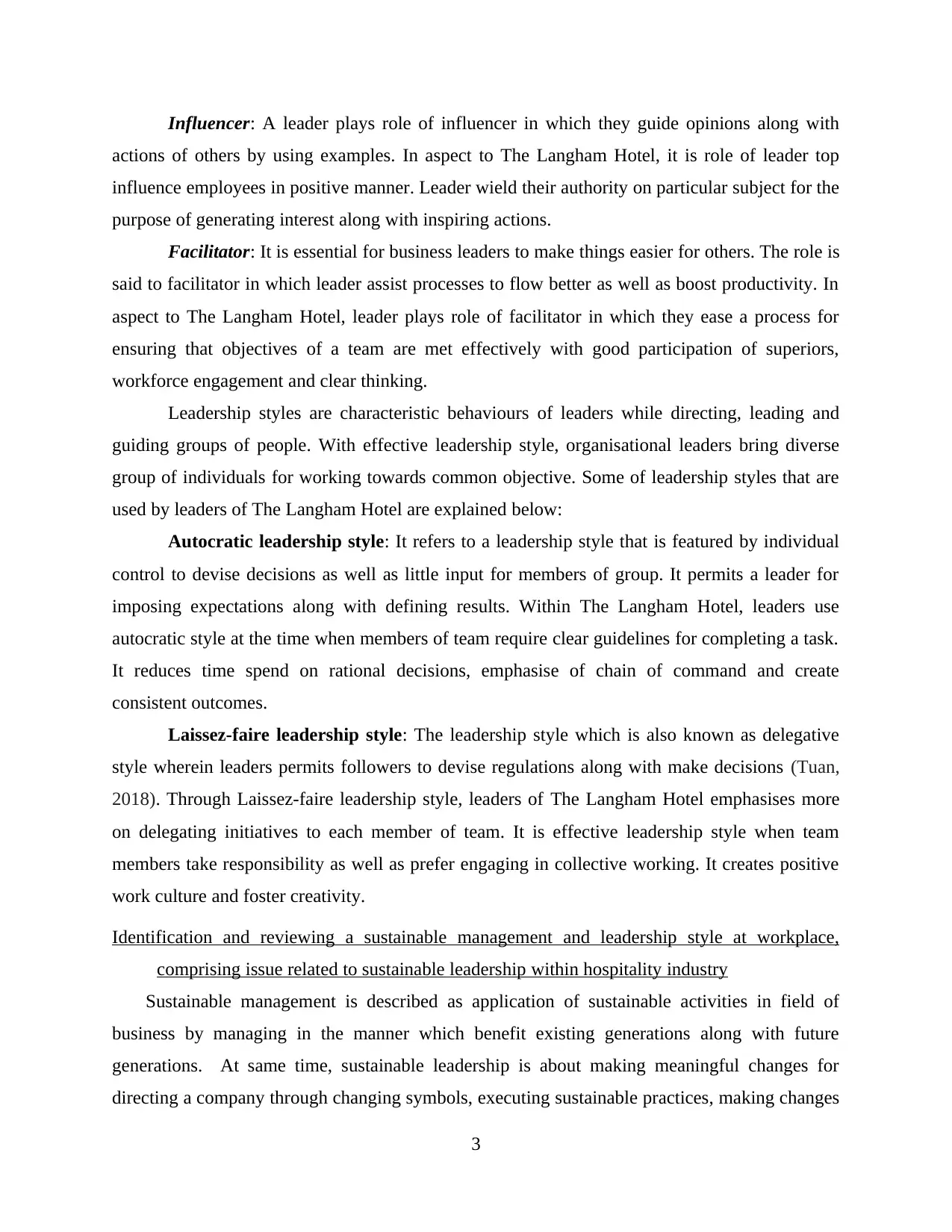
Influencer: A leader plays role of influencer in which they guide opinions along with
actions of others by using examples. In aspect to The Langham Hotel, it is role of leader top
influence employees in positive manner. Leader wield their authority on particular subject for the
purpose of generating interest along with inspiring actions.
Facilitator: It is essential for business leaders to make things easier for others. The role is
said to facilitator in which leader assist processes to flow better as well as boost productivity. In
aspect to The Langham Hotel, leader plays role of facilitator in which they ease a process for
ensuring that objectives of a team are met effectively with good participation of superiors,
workforce engagement and clear thinking.
Leadership styles are characteristic behaviours of leaders while directing, leading and
guiding groups of people. With effective leadership style, organisational leaders bring diverse
group of individuals for working towards common objective. Some of leadership styles that are
used by leaders of The Langham Hotel are explained below:
Autocratic leadership style: It refers to a leadership style that is featured by individual
control to devise decisions as well as little input for members of group. It permits a leader for
imposing expectations along with defining results. Within The Langham Hotel, leaders use
autocratic style at the time when members of team require clear guidelines for completing a task.
It reduces time spend on rational decisions, emphasise of chain of command and create
consistent outcomes.
Laissez-faire leadership style: The leadership style which is also known as delegative
style wherein leaders permits followers to devise regulations along with make decisions (Tuan,
2018). Through Laissez-faire leadership style, leaders of The Langham Hotel emphasises more
on delegating initiatives to each member of team. It is effective leadership style when team
members take responsibility as well as prefer engaging in collective working. It creates positive
work culture and foster creativity.
Identification and reviewing a sustainable management and leadership style at workplace,
comprising issue related to sustainable leadership within hospitality industry
Sustainable management is described as application of sustainable activities in field of
business by managing in the manner which benefit existing generations along with future
generations. At same time, sustainable leadership is about making meaningful changes for
directing a company through changing symbols, executing sustainable practices, making changes
3
actions of others by using examples. In aspect to The Langham Hotel, it is role of leader top
influence employees in positive manner. Leader wield their authority on particular subject for the
purpose of generating interest along with inspiring actions.
Facilitator: It is essential for business leaders to make things easier for others. The role is
said to facilitator in which leader assist processes to flow better as well as boost productivity. In
aspect to The Langham Hotel, leader plays role of facilitator in which they ease a process for
ensuring that objectives of a team are met effectively with good participation of superiors,
workforce engagement and clear thinking.
Leadership styles are characteristic behaviours of leaders while directing, leading and
guiding groups of people. With effective leadership style, organisational leaders bring diverse
group of individuals for working towards common objective. Some of leadership styles that are
used by leaders of The Langham Hotel are explained below:
Autocratic leadership style: It refers to a leadership style that is featured by individual
control to devise decisions as well as little input for members of group. It permits a leader for
imposing expectations along with defining results. Within The Langham Hotel, leaders use
autocratic style at the time when members of team require clear guidelines for completing a task.
It reduces time spend on rational decisions, emphasise of chain of command and create
consistent outcomes.
Laissez-faire leadership style: The leadership style which is also known as delegative
style wherein leaders permits followers to devise regulations along with make decisions (Tuan,
2018). Through Laissez-faire leadership style, leaders of The Langham Hotel emphasises more
on delegating initiatives to each member of team. It is effective leadership style when team
members take responsibility as well as prefer engaging in collective working. It creates positive
work culture and foster creativity.
Identification and reviewing a sustainable management and leadership style at workplace,
comprising issue related to sustainable leadership within hospitality industry
Sustainable management is described as application of sustainable activities in field of
business by managing in the manner which benefit existing generations along with future
generations. At same time, sustainable leadership is about making meaningful changes for
directing a company through changing symbols, executing sustainable practices, making changes
3
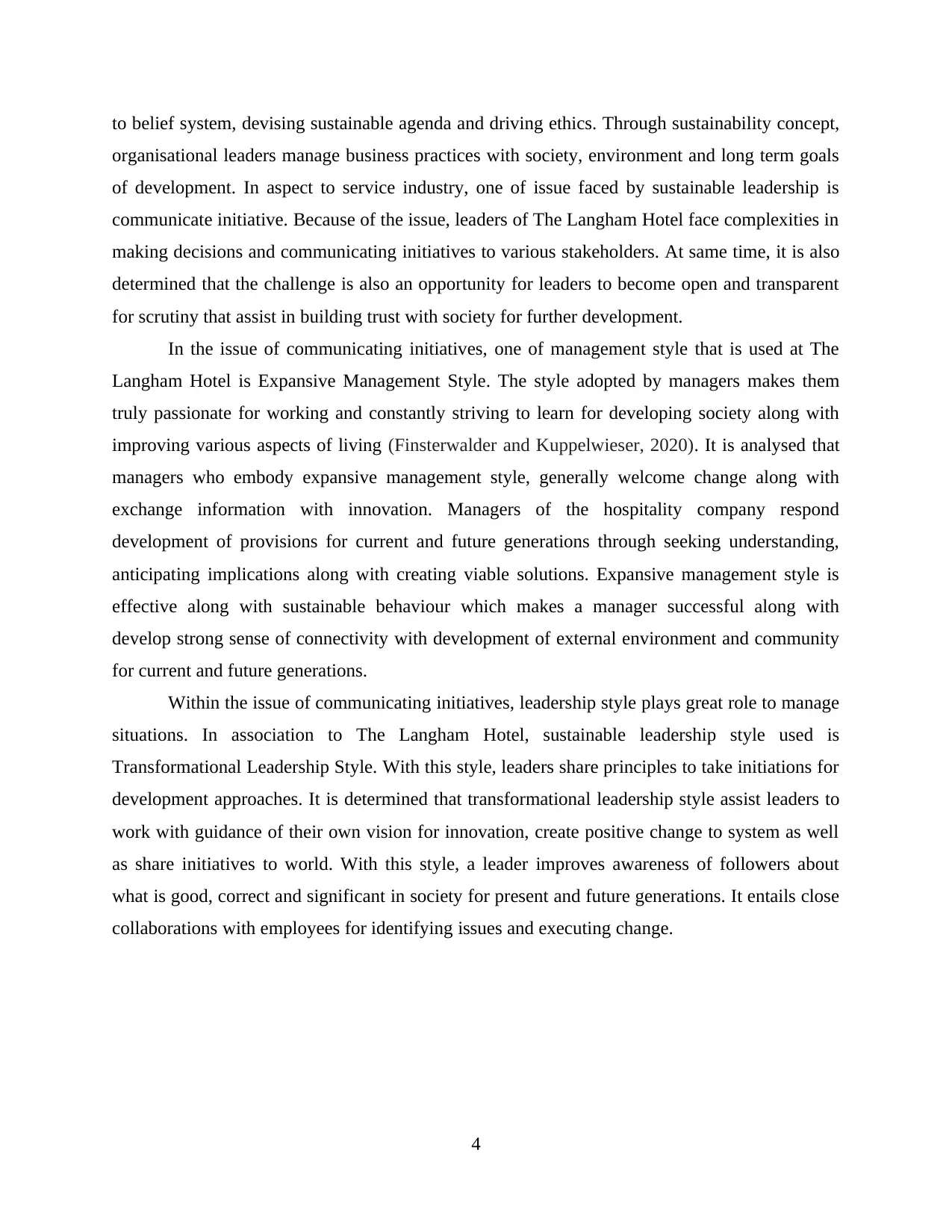
to belief system, devising sustainable agenda and driving ethics. Through sustainability concept,
organisational leaders manage business practices with society, environment and long term goals
of development. In aspect to service industry, one of issue faced by sustainable leadership is
communicate initiative. Because of the issue, leaders of The Langham Hotel face complexities in
making decisions and communicating initiatives to various stakeholders. At same time, it is also
determined that the challenge is also an opportunity for leaders to become open and transparent
for scrutiny that assist in building trust with society for further development.
In the issue of communicating initiatives, one of management style that is used at The
Langham Hotel is Expansive Management Style. The style adopted by managers makes them
truly passionate for working and constantly striving to learn for developing society along with
improving various aspects of living (Finsterwalder and Kuppelwieser, 2020). It is analysed that
managers who embody expansive management style, generally welcome change along with
exchange information with innovation. Managers of the hospitality company respond
development of provisions for current and future generations through seeking understanding,
anticipating implications along with creating viable solutions. Expansive management style is
effective along with sustainable behaviour which makes a manager successful along with
develop strong sense of connectivity with development of external environment and community
for current and future generations.
Within the issue of communicating initiatives, leadership style plays great role to manage
situations. In association to The Langham Hotel, sustainable leadership style used is
Transformational Leadership Style. With this style, leaders share principles to take initiations for
development approaches. It is determined that transformational leadership style assist leaders to
work with guidance of their own vision for innovation, create positive change to system as well
as share initiatives to world. With this style, a leader improves awareness of followers about
what is good, correct and significant in society for present and future generations. It entails close
collaborations with employees for identifying issues and executing change.
4
organisational leaders manage business practices with society, environment and long term goals
of development. In aspect to service industry, one of issue faced by sustainable leadership is
communicate initiative. Because of the issue, leaders of The Langham Hotel face complexities in
making decisions and communicating initiatives to various stakeholders. At same time, it is also
determined that the challenge is also an opportunity for leaders to become open and transparent
for scrutiny that assist in building trust with society for further development.
In the issue of communicating initiatives, one of management style that is used at The
Langham Hotel is Expansive Management Style. The style adopted by managers makes them
truly passionate for working and constantly striving to learn for developing society along with
improving various aspects of living (Finsterwalder and Kuppelwieser, 2020). It is analysed that
managers who embody expansive management style, generally welcome change along with
exchange information with innovation. Managers of the hospitality company respond
development of provisions for current and future generations through seeking understanding,
anticipating implications along with creating viable solutions. Expansive management style is
effective along with sustainable behaviour which makes a manager successful along with
develop strong sense of connectivity with development of external environment and community
for current and future generations.
Within the issue of communicating initiatives, leadership style plays great role to manage
situations. In association to The Langham Hotel, sustainable leadership style used is
Transformational Leadership Style. With this style, leaders share principles to take initiations for
development approaches. It is determined that transformational leadership style assist leaders to
work with guidance of their own vision for innovation, create positive change to system as well
as share initiatives to world. With this style, a leader improves awareness of followers about
what is good, correct and significant in society for present and future generations. It entails close
collaborations with employees for identifying issues and executing change.
4
Paraphrase This Document
Need a fresh take? Get an instant paraphrase of this document with our AI Paraphraser
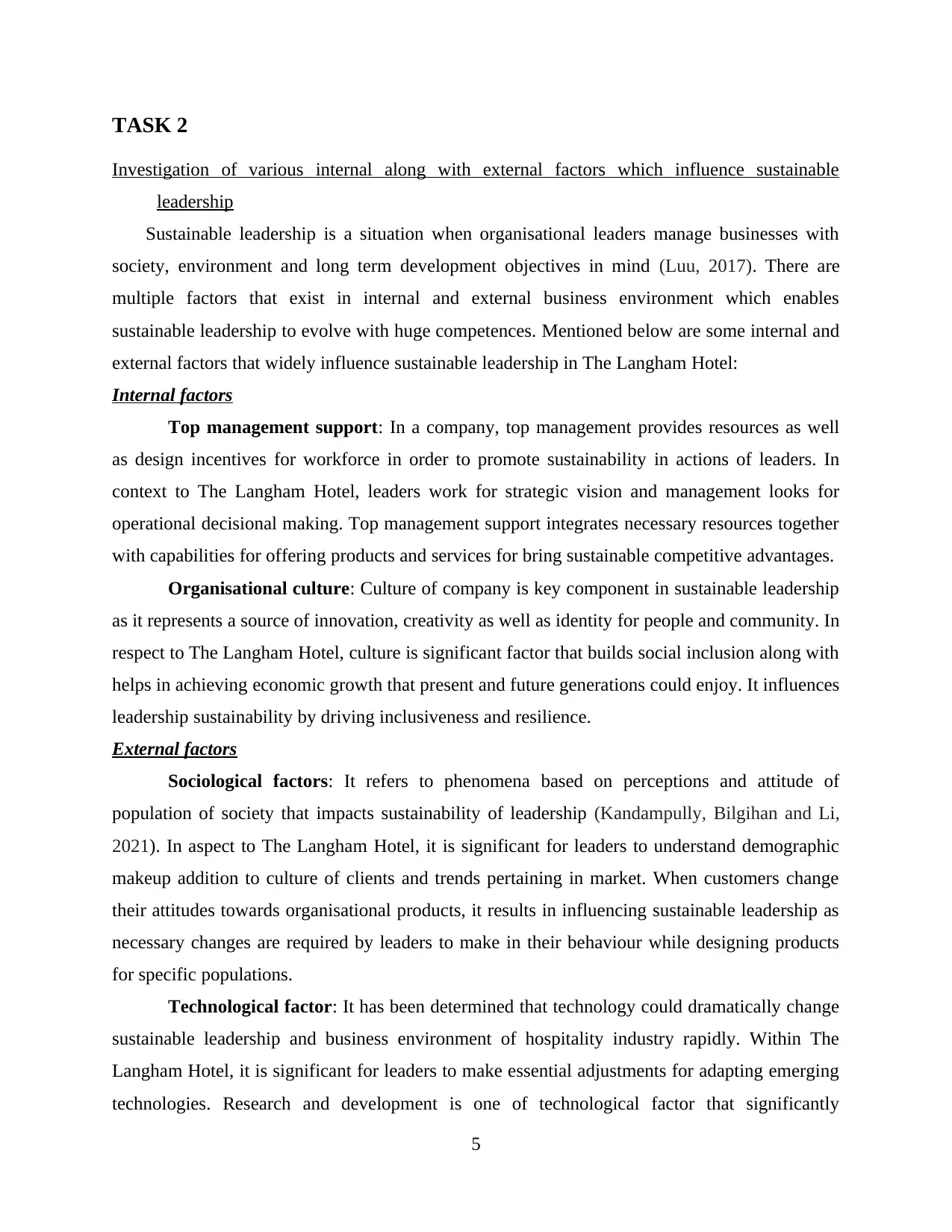
TASK 2
Investigation of various internal along with external factors which influence sustainable
leadership
Sustainable leadership is a situation when organisational leaders manage businesses with
society, environment and long term development objectives in mind (Luu, 2017). There are
multiple factors that exist in internal and external business environment which enables
sustainable leadership to evolve with huge competences. Mentioned below are some internal and
external factors that widely influence sustainable leadership in The Langham Hotel:
Internal factors
Top management support: In a company, top management provides resources as well
as design incentives for workforce in order to promote sustainability in actions of leaders. In
context to The Langham Hotel, leaders work for strategic vision and management looks for
operational decisional making. Top management support integrates necessary resources together
with capabilities for offering products and services for bring sustainable competitive advantages.
Organisational culture: Culture of company is key component in sustainable leadership
as it represents a source of innovation, creativity as well as identity for people and community. In
respect to The Langham Hotel, culture is significant factor that builds social inclusion along with
helps in achieving economic growth that present and future generations could enjoy. It influences
leadership sustainability by driving inclusiveness and resilience.
External factors
Sociological factors: It refers to phenomena based on perceptions and attitude of
population of society that impacts sustainability of leadership (Kandampully, Bilgihan and Li,
2021). In aspect to The Langham Hotel, it is significant for leaders to understand demographic
makeup addition to culture of clients and trends pertaining in market. When customers change
their attitudes towards organisational products, it results in influencing sustainable leadership as
necessary changes are required by leaders to make in their behaviour while designing products
for specific populations.
Technological factor: It has been determined that technology could dramatically change
sustainable leadership and business environment of hospitality industry rapidly. Within The
Langham Hotel, it is significant for leaders to make essential adjustments for adapting emerging
technologies. Research and development is one of technological factor that significantly
5
Investigation of various internal along with external factors which influence sustainable
leadership
Sustainable leadership is a situation when organisational leaders manage businesses with
society, environment and long term development objectives in mind (Luu, 2017). There are
multiple factors that exist in internal and external business environment which enables
sustainable leadership to evolve with huge competences. Mentioned below are some internal and
external factors that widely influence sustainable leadership in The Langham Hotel:
Internal factors
Top management support: In a company, top management provides resources as well
as design incentives for workforce in order to promote sustainability in actions of leaders. In
context to The Langham Hotel, leaders work for strategic vision and management looks for
operational decisional making. Top management support integrates necessary resources together
with capabilities for offering products and services for bring sustainable competitive advantages.
Organisational culture: Culture of company is key component in sustainable leadership
as it represents a source of innovation, creativity as well as identity for people and community. In
respect to The Langham Hotel, culture is significant factor that builds social inclusion along with
helps in achieving economic growth that present and future generations could enjoy. It influences
leadership sustainability by driving inclusiveness and resilience.
External factors
Sociological factors: It refers to phenomena based on perceptions and attitude of
population of society that impacts sustainability of leadership (Kandampully, Bilgihan and Li,
2021). In aspect to The Langham Hotel, it is significant for leaders to understand demographic
makeup addition to culture of clients and trends pertaining in market. When customers change
their attitudes towards organisational products, it results in influencing sustainable leadership as
necessary changes are required by leaders to make in their behaviour while designing products
for specific populations.
Technological factor: It has been determined that technology could dramatically change
sustainable leadership and business environment of hospitality industry rapidly. Within The
Langham Hotel, it is significant for leaders to make essential adjustments for adapting emerging
technologies. Research and development is one of technological factor that significantly
5
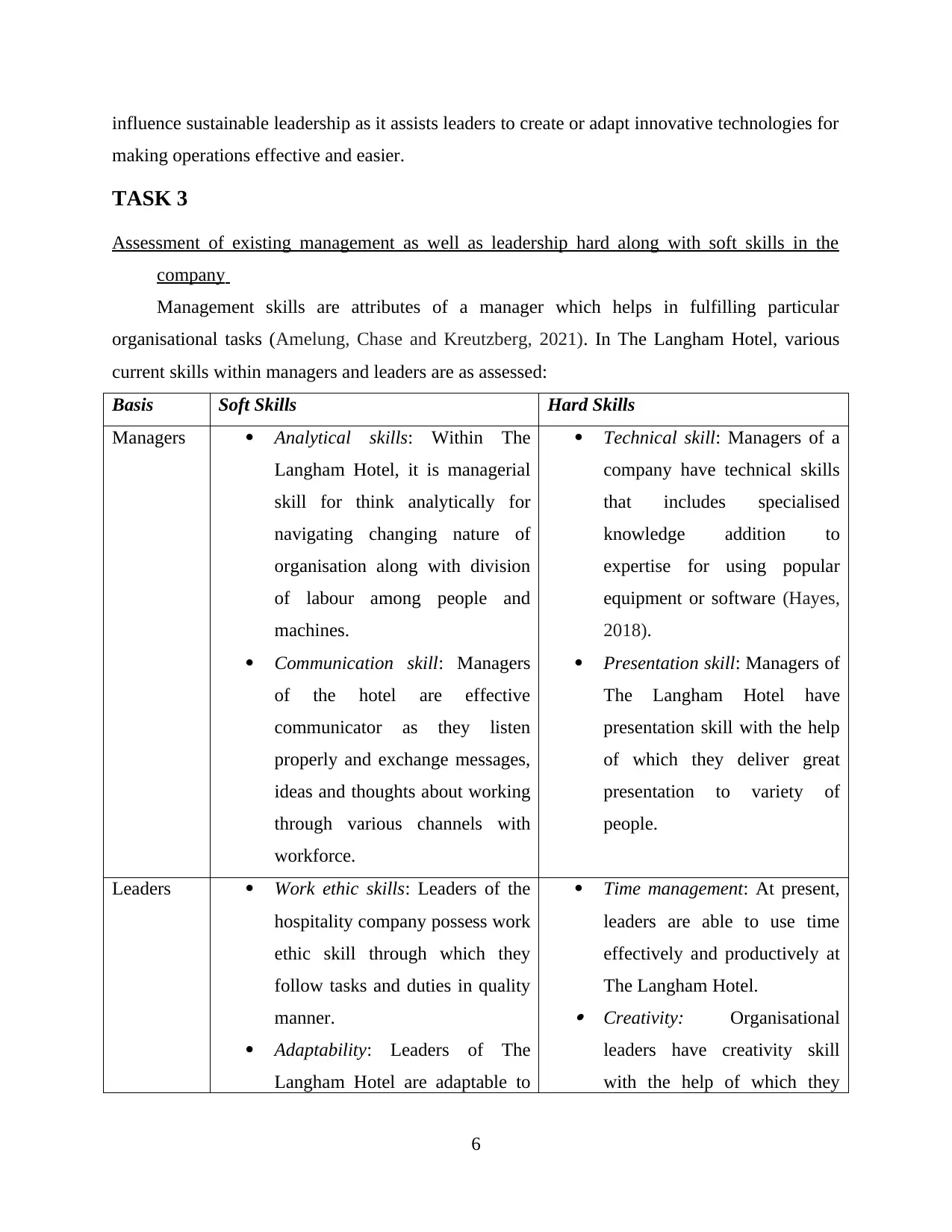
influence sustainable leadership as it assists leaders to create or adapt innovative technologies for
making operations effective and easier.
TASK 3
Assessment of existing management as well as leadership hard along with soft skills in the
company
Management skills are attributes of a manager which helps in fulfilling particular
organisational tasks (Amelung, Chase and Kreutzberg, 2021). In The Langham Hotel, various
current skills within managers and leaders are as assessed:
Basis Soft Skills Hard Skills
Managers Analytical skills: Within The
Langham Hotel, it is managerial
skill for think analytically for
navigating changing nature of
organisation along with division
of labour among people and
machines.
Communication skill: Managers
of the hotel are effective
communicator as they listen
properly and exchange messages,
ideas and thoughts about working
through various channels with
workforce.
Technical skill: Managers of a
company have technical skills
that includes specialised
knowledge addition to
expertise for using popular
equipment or software (Hayes,
2018).
Presentation skill: Managers of
The Langham Hotel have
presentation skill with the help
of which they deliver great
presentation to variety of
people.
Leaders Work ethic skills: Leaders of the
hospitality company possess work
ethic skill through which they
follow tasks and duties in quality
manner.
Adaptability: Leaders of The
Langham Hotel are adaptable to
Time management: At present,
leaders are able to use time
effectively and productively at
The Langham Hotel.
Creativity: Organisational
leaders have creativity skill
with the help of which they
6
making operations effective and easier.
TASK 3
Assessment of existing management as well as leadership hard along with soft skills in the
company
Management skills are attributes of a manager which helps in fulfilling particular
organisational tasks (Amelung, Chase and Kreutzberg, 2021). In The Langham Hotel, various
current skills within managers and leaders are as assessed:
Basis Soft Skills Hard Skills
Managers Analytical skills: Within The
Langham Hotel, it is managerial
skill for think analytically for
navigating changing nature of
organisation along with division
of labour among people and
machines.
Communication skill: Managers
of the hotel are effective
communicator as they listen
properly and exchange messages,
ideas and thoughts about working
through various channels with
workforce.
Technical skill: Managers of a
company have technical skills
that includes specialised
knowledge addition to
expertise for using popular
equipment or software (Hayes,
2018).
Presentation skill: Managers of
The Langham Hotel have
presentation skill with the help
of which they deliver great
presentation to variety of
people.
Leaders Work ethic skills: Leaders of the
hospitality company possess work
ethic skill through which they
follow tasks and duties in quality
manner.
Adaptability: Leaders of The
Langham Hotel are adaptable to
Time management: At present,
leaders are able to use time
effectively and productively at
The Langham Hotel.
Creativity: Organisational
leaders have creativity skill
with the help of which they
6
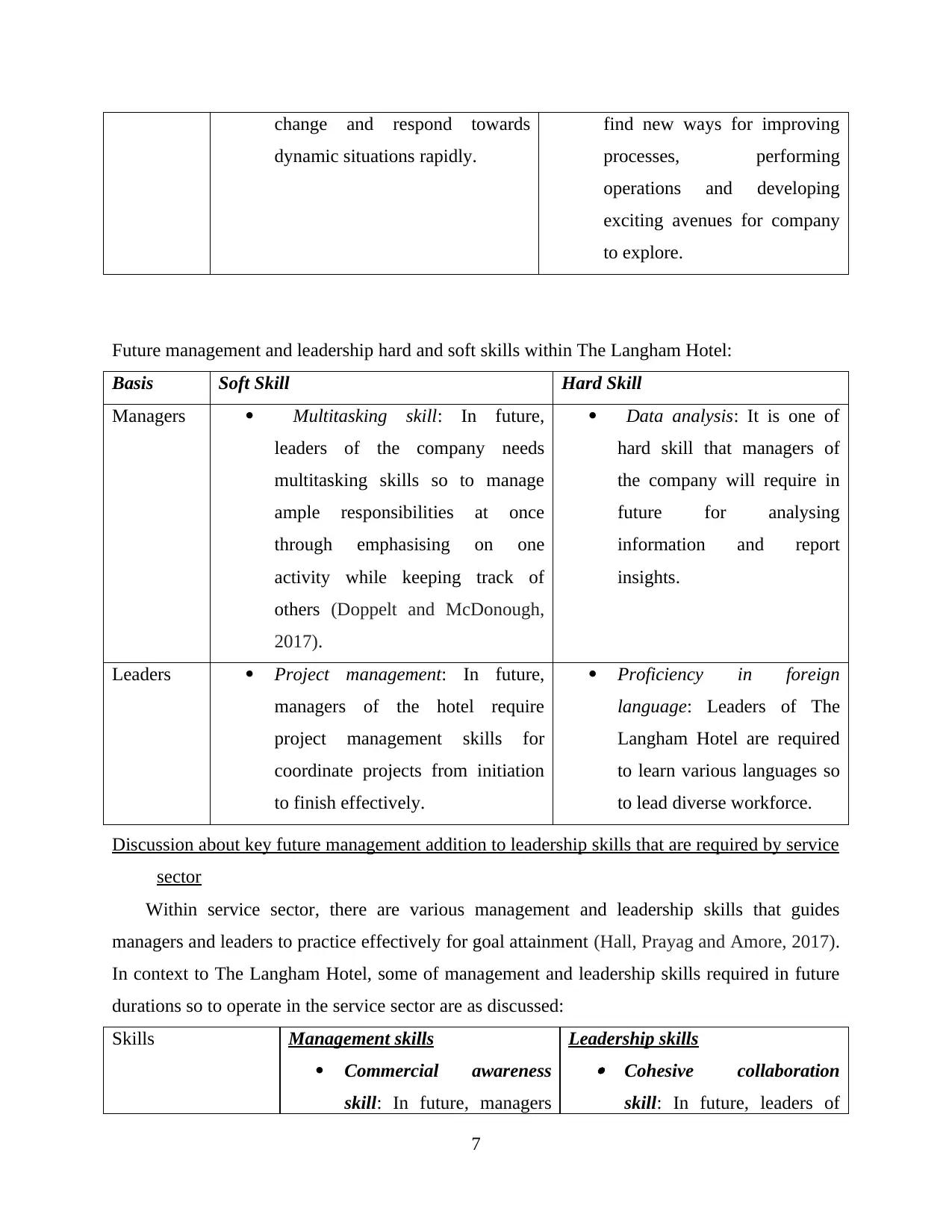
change and respond towards
dynamic situations rapidly.
find new ways for improving
processes, performing
operations and developing
exciting avenues for company
to explore.
Future management and leadership hard and soft skills within The Langham Hotel:
Basis Soft Skill Hard Skill
Managers Multitasking skill: In future,
leaders of the company needs
multitasking skills so to manage
ample responsibilities at once
through emphasising on one
activity while keeping track of
others (Doppelt and McDonough,
2017).
Data analysis: It is one of
hard skill that managers of
the company will require in
future for analysing
information and report
insights.
Leaders Project management: In future,
managers of the hotel require
project management skills for
coordinate projects from initiation
to finish effectively.
Proficiency in foreign
language: Leaders of The
Langham Hotel are required
to learn various languages so
to lead diverse workforce.
Discussion about key future management addition to leadership skills that are required by service
sector
Within service sector, there are various management and leadership skills that guides
managers and leaders to practice effectively for goal attainment (Hall, Prayag and Amore, 2017).
In context to The Langham Hotel, some of management and leadership skills required in future
durations so to operate in the service sector are as discussed:
Skills Management skills
Commercial awareness
skill: In future, managers
Leadership skills
Cohesive collaboration
skill: In future, leaders of
7
dynamic situations rapidly.
find new ways for improving
processes, performing
operations and developing
exciting avenues for company
to explore.
Future management and leadership hard and soft skills within The Langham Hotel:
Basis Soft Skill Hard Skill
Managers Multitasking skill: In future,
leaders of the company needs
multitasking skills so to manage
ample responsibilities at once
through emphasising on one
activity while keeping track of
others (Doppelt and McDonough,
2017).
Data analysis: It is one of
hard skill that managers of
the company will require in
future for analysing
information and report
insights.
Leaders Project management: In future,
managers of the hotel require
project management skills for
coordinate projects from initiation
to finish effectively.
Proficiency in foreign
language: Leaders of The
Langham Hotel are required
to learn various languages so
to lead diverse workforce.
Discussion about key future management addition to leadership skills that are required by service
sector
Within service sector, there are various management and leadership skills that guides
managers and leaders to practice effectively for goal attainment (Hall, Prayag and Amore, 2017).
In context to The Langham Hotel, some of management and leadership skills required in future
durations so to operate in the service sector are as discussed:
Skills Management skills
Commercial awareness
skill: In future, managers
Leadership skills
Cohesive collaboration
skill: In future, leaders of
7
Secure Best Marks with AI Grader
Need help grading? Try our AI Grader for instant feedback on your assignments.
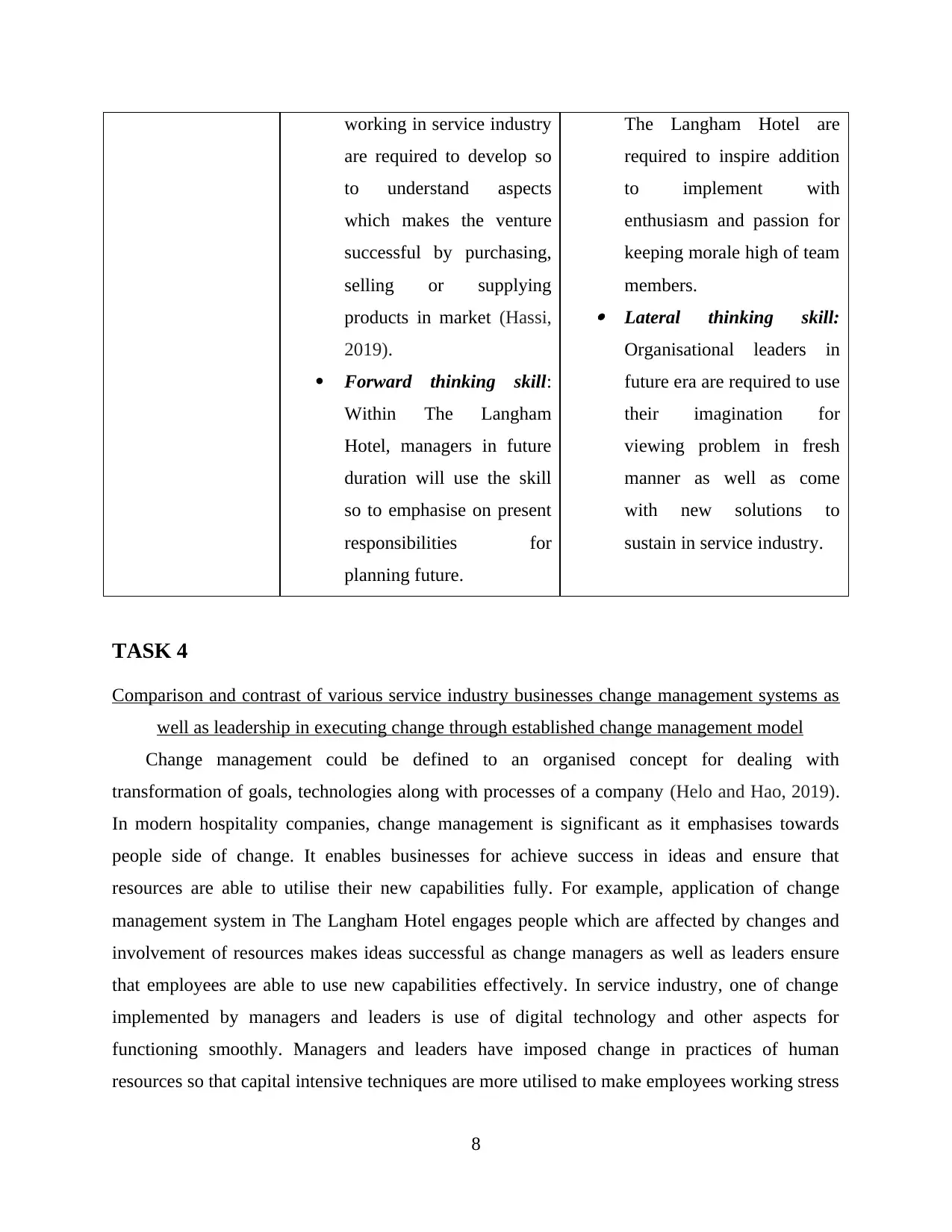
working in service industry
are required to develop so
to understand aspects
which makes the venture
successful by purchasing,
selling or supplying
products in market (Hassi,
2019).
Forward thinking skill:
Within The Langham
Hotel, managers in future
duration will use the skill
so to emphasise on present
responsibilities for
planning future.
The Langham Hotel are
required to inspire addition
to implement with
enthusiasm and passion for
keeping morale high of team
members.
Lateral thinking skill:
Organisational leaders in
future era are required to use
their imagination for
viewing problem in fresh
manner as well as come
with new solutions to
sustain in service industry.
TASK 4
Comparison and contrast of various service industry businesses change management systems as
well as leadership in executing change through established change management model
Change management could be defined to an organised concept for dealing with
transformation of goals, technologies along with processes of a company (Helo and Hao, 2019).
In modern hospitality companies, change management is significant as it emphasises towards
people side of change. It enables businesses for achieve success in ideas and ensure that
resources are able to utilise their new capabilities fully. For example, application of change
management system in The Langham Hotel engages people which are affected by changes and
involvement of resources makes ideas successful as change managers as well as leaders ensure
that employees are able to use new capabilities effectively. In service industry, one of change
implemented by managers and leaders is use of digital technology and other aspects for
functioning smoothly. Managers and leaders have imposed change in practices of human
resources so that capital intensive techniques are more utilised to make employees working stress
8
are required to develop so
to understand aspects
which makes the venture
successful by purchasing,
selling or supplying
products in market (Hassi,
2019).
Forward thinking skill:
Within The Langham
Hotel, managers in future
duration will use the skill
so to emphasise on present
responsibilities for
planning future.
The Langham Hotel are
required to inspire addition
to implement with
enthusiasm and passion for
keeping morale high of team
members.
Lateral thinking skill:
Organisational leaders in
future era are required to use
their imagination for
viewing problem in fresh
manner as well as come
with new solutions to
sustain in service industry.
TASK 4
Comparison and contrast of various service industry businesses change management systems as
well as leadership in executing change through established change management model
Change management could be defined to an organised concept for dealing with
transformation of goals, technologies along with processes of a company (Helo and Hao, 2019).
In modern hospitality companies, change management is significant as it emphasises towards
people side of change. It enables businesses for achieve success in ideas and ensure that
resources are able to utilise their new capabilities fully. For example, application of change
management system in The Langham Hotel engages people which are affected by changes and
involvement of resources makes ideas successful as change managers as well as leaders ensure
that employees are able to use new capabilities effectively. In service industry, one of change
implemented by managers and leaders is use of digital technology and other aspects for
functioning smoothly. Managers and leaders have imposed change in practices of human
resources so that capital intensive techniques are more utilised to make employees working stress
8
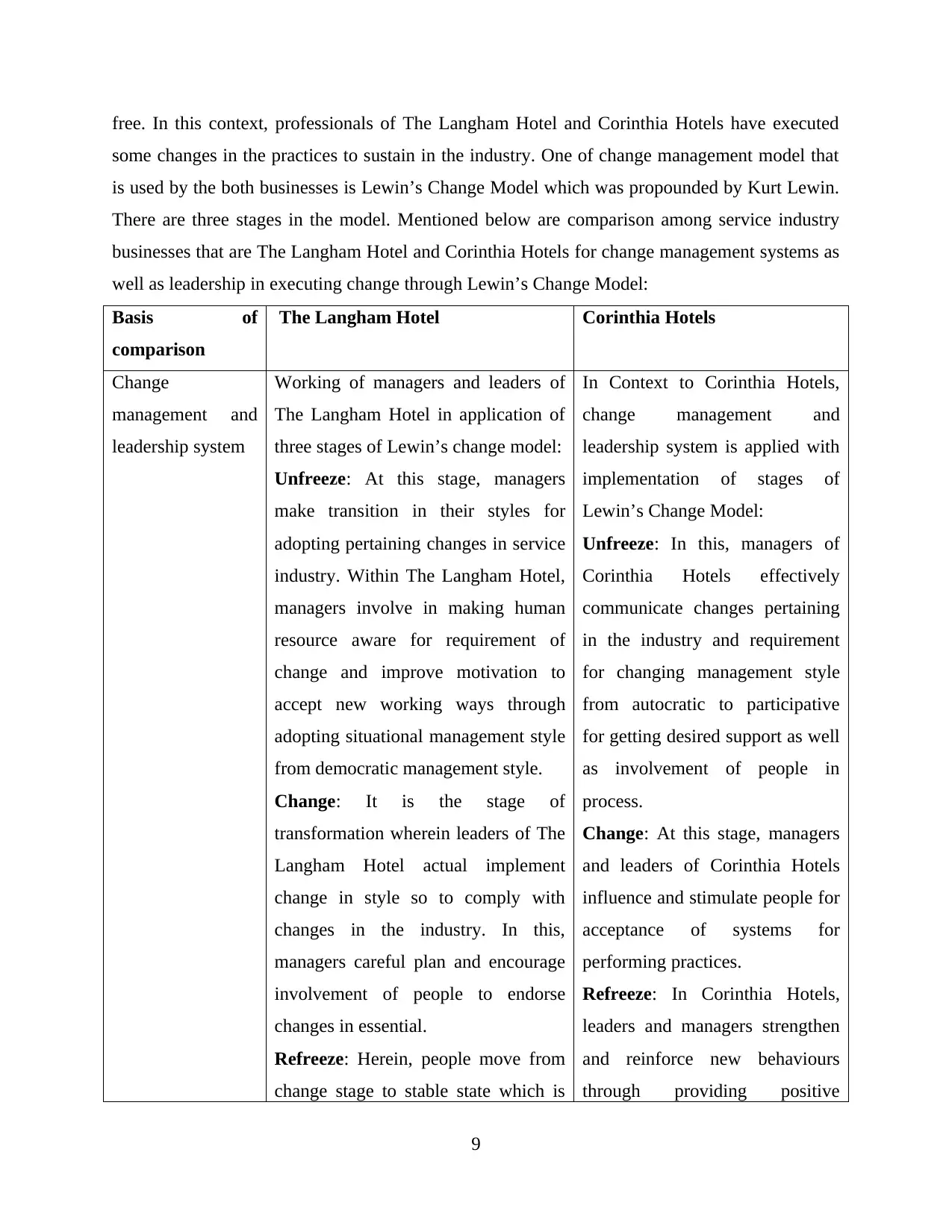
free. In this context, professionals of The Langham Hotel and Corinthia Hotels have executed
some changes in the practices to sustain in the industry. One of change management model that
is used by the both businesses is Lewin’s Change Model which was propounded by Kurt Lewin.
There are three stages in the model. Mentioned below are comparison among service industry
businesses that are The Langham Hotel and Corinthia Hotels for change management systems as
well as leadership in executing change through Lewin’s Change Model:
Basis of
comparison
The Langham Hotel Corinthia Hotels
Change
management and
leadership system
Working of managers and leaders of
The Langham Hotel in application of
three stages of Lewin’s change model:
Unfreeze: At this stage, managers
make transition in their styles for
adopting pertaining changes in service
industry. Within The Langham Hotel,
managers involve in making human
resource aware for requirement of
change and improve motivation to
accept new working ways through
adopting situational management style
from democratic management style.
Change: It is the stage of
transformation wherein leaders of The
Langham Hotel actual implement
change in style so to comply with
changes in the industry. In this,
managers careful plan and encourage
involvement of people to endorse
changes in essential.
Refreeze: Herein, people move from
change stage to stable state which is
In Context to Corinthia Hotels,
change management and
leadership system is applied with
implementation of stages of
Lewin’s Change Model:
Unfreeze: In this, managers of
Corinthia Hotels effectively
communicate changes pertaining
in the industry and requirement
for changing management style
from autocratic to participative
for getting desired support as well
as involvement of people in
process.
Change: At this stage, managers
and leaders of Corinthia Hotels
influence and stimulate people for
acceptance of systems for
performing practices.
Refreeze: In Corinthia Hotels,
leaders and managers strengthen
and reinforce new behaviours
through providing positive
9
some changes in the practices to sustain in the industry. One of change management model that
is used by the both businesses is Lewin’s Change Model which was propounded by Kurt Lewin.
There are three stages in the model. Mentioned below are comparison among service industry
businesses that are The Langham Hotel and Corinthia Hotels for change management systems as
well as leadership in executing change through Lewin’s Change Model:
Basis of
comparison
The Langham Hotel Corinthia Hotels
Change
management and
leadership system
Working of managers and leaders of
The Langham Hotel in application of
three stages of Lewin’s change model:
Unfreeze: At this stage, managers
make transition in their styles for
adopting pertaining changes in service
industry. Within The Langham Hotel,
managers involve in making human
resource aware for requirement of
change and improve motivation to
accept new working ways through
adopting situational management style
from democratic management style.
Change: It is the stage of
transformation wherein leaders of The
Langham Hotel actual implement
change in style so to comply with
changes in the industry. In this,
managers careful plan and encourage
involvement of people to endorse
changes in essential.
Refreeze: Herein, people move from
change stage to stable state which is
In Context to Corinthia Hotels,
change management and
leadership system is applied with
implementation of stages of
Lewin’s Change Model:
Unfreeze: In this, managers of
Corinthia Hotels effectively
communicate changes pertaining
in the industry and requirement
for changing management style
from autocratic to participative
for getting desired support as well
as involvement of people in
process.
Change: At this stage, managers
and leaders of Corinthia Hotels
influence and stimulate people for
acceptance of systems for
performing practices.
Refreeze: In Corinthia Hotels,
leaders and managers strengthen
and reinforce new behaviours
through providing positive
9
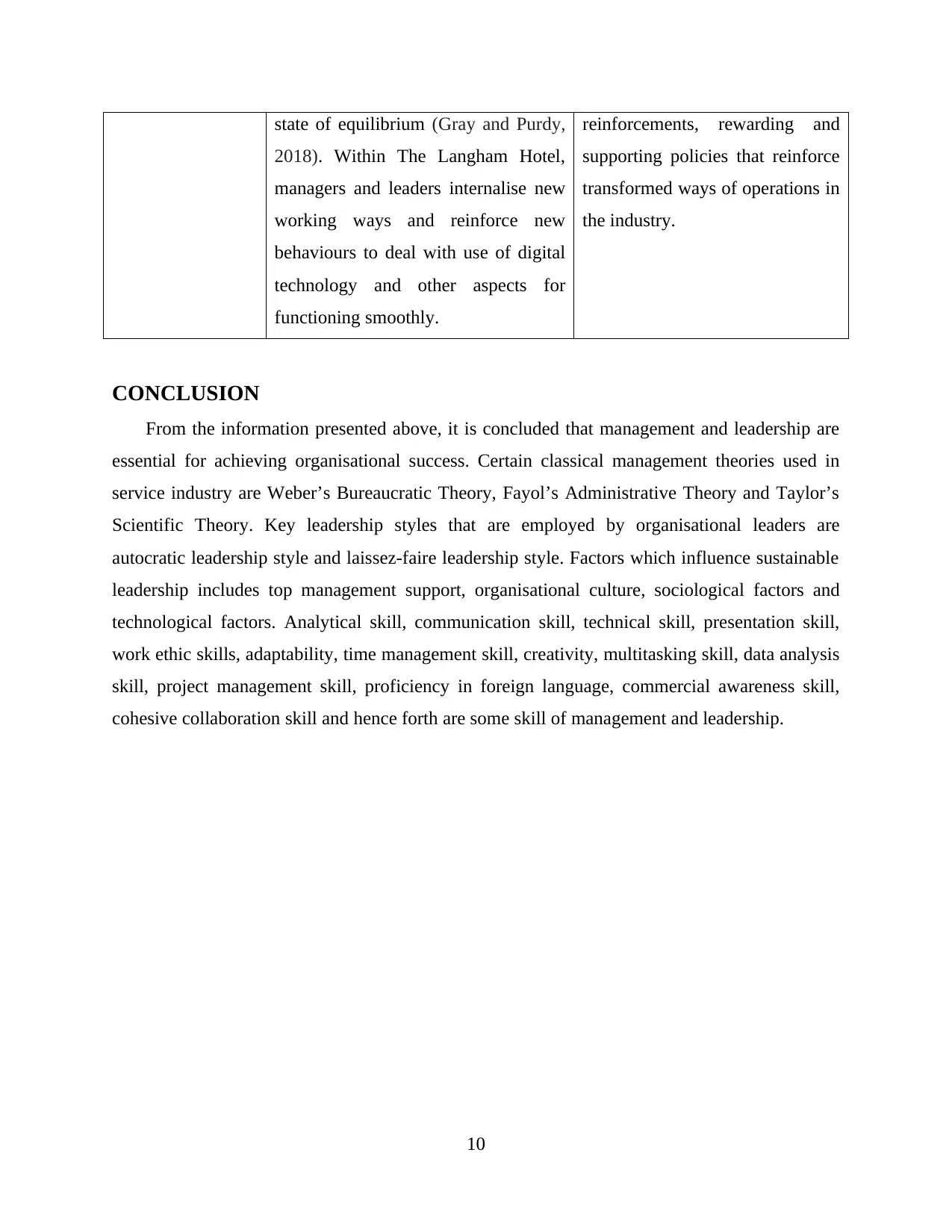
state of equilibrium (Gray and Purdy,
2018). Within The Langham Hotel,
managers and leaders internalise new
working ways and reinforce new
behaviours to deal with use of digital
technology and other aspects for
functioning smoothly.
reinforcements, rewarding and
supporting policies that reinforce
transformed ways of operations in
the industry.
CONCLUSION
From the information presented above, it is concluded that management and leadership are
essential for achieving organisational success. Certain classical management theories used in
service industry are Weber’s Bureaucratic Theory, Fayol’s Administrative Theory and Taylor’s
Scientific Theory. Key leadership styles that are employed by organisational leaders are
autocratic leadership style and laissez-faire leadership style. Factors which influence sustainable
leadership includes top management support, organisational culture, sociological factors and
technological factors. Analytical skill, communication skill, technical skill, presentation skill,
work ethic skills, adaptability, time management skill, creativity, multitasking skill, data analysis
skill, project management skill, proficiency in foreign language, commercial awareness skill,
cohesive collaboration skill and hence forth are some skill of management and leadership.
10
2018). Within The Langham Hotel,
managers and leaders internalise new
working ways and reinforce new
behaviours to deal with use of digital
technology and other aspects for
functioning smoothly.
reinforcements, rewarding and
supporting policies that reinforce
transformed ways of operations in
the industry.
CONCLUSION
From the information presented above, it is concluded that management and leadership are
essential for achieving organisational success. Certain classical management theories used in
service industry are Weber’s Bureaucratic Theory, Fayol’s Administrative Theory and Taylor’s
Scientific Theory. Key leadership styles that are employed by organisational leaders are
autocratic leadership style and laissez-faire leadership style. Factors which influence sustainable
leadership includes top management support, organisational culture, sociological factors and
technological factors. Analytical skill, communication skill, technical skill, presentation skill,
work ethic skills, adaptability, time management skill, creativity, multitasking skill, data analysis
skill, project management skill, proficiency in foreign language, commercial awareness skill,
cohesive collaboration skill and hence forth are some skill of management and leadership.
10
Paraphrase This Document
Need a fresh take? Get an instant paraphrase of this document with our AI Paraphraser
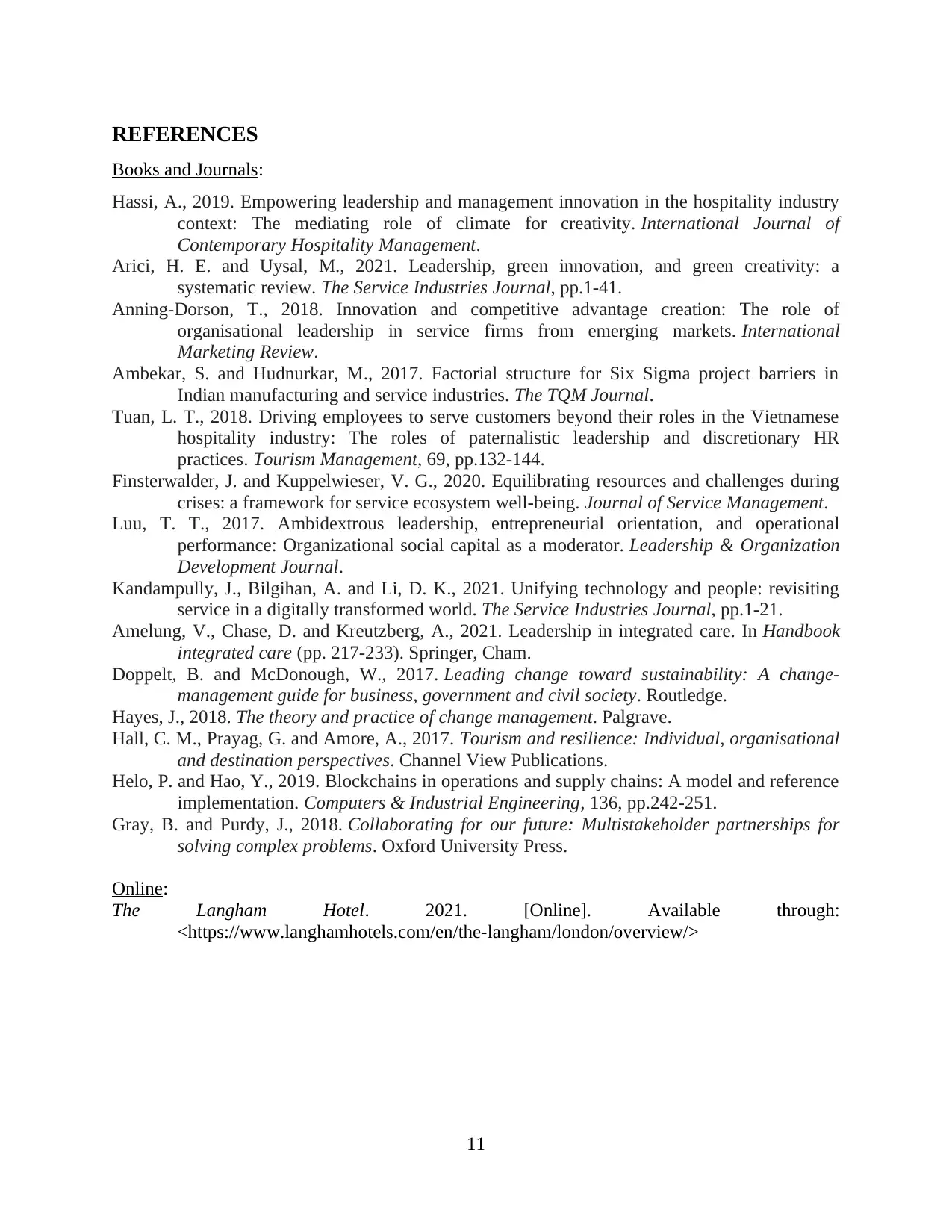
REFERENCES
Books and Journals:
Hassi, A., 2019. Empowering leadership and management innovation in the hospitality industry
context: The mediating role of climate for creativity. International Journal of
Contemporary Hospitality Management.
Arici, H. E. and Uysal, M., 2021. Leadership, green innovation, and green creativity: a
systematic review. The Service Industries Journal, pp.1-41.
Anning-Dorson, T., 2018. Innovation and competitive advantage creation: The role of
organisational leadership in service firms from emerging markets. International
Marketing Review.
Ambekar, S. and Hudnurkar, M., 2017. Factorial structure for Six Sigma project barriers in
Indian manufacturing and service industries. The TQM Journal.
Tuan, L. T., 2018. Driving employees to serve customers beyond their roles in the Vietnamese
hospitality industry: The roles of paternalistic leadership and discretionary HR
practices. Tourism Management, 69, pp.132-144.
Finsterwalder, J. and Kuppelwieser, V. G., 2020. Equilibrating resources and challenges during
crises: a framework for service ecosystem well-being. Journal of Service Management.
Luu, T. T., 2017. Ambidextrous leadership, entrepreneurial orientation, and operational
performance: Organizational social capital as a moderator. Leadership & Organization
Development Journal.
Kandampully, J., Bilgihan, A. and Li, D. K., 2021. Unifying technology and people: revisiting
service in a digitally transformed world. The Service Industries Journal, pp.1-21.
Amelung, V., Chase, D. and Kreutzberg, A., 2021. Leadership in integrated care. In Handbook
integrated care (pp. 217-233). Springer, Cham.
Doppelt, B. and McDonough, W., 2017. Leading change toward sustainability: A change-
management guide for business, government and civil society. Routledge.
Hayes, J., 2018. The theory and practice of change management. Palgrave.
Hall, C. M., Prayag, G. and Amore, A., 2017. Tourism and resilience: Individual, organisational
and destination perspectives. Channel View Publications.
Helo, P. and Hao, Y., 2019. Blockchains in operations and supply chains: A model and reference
implementation. Computers & Industrial Engineering, 136, pp.242-251.
Gray, B. and Purdy, J., 2018. Collaborating for our future: Multistakeholder partnerships for
solving complex problems. Oxford University Press.
Online:
The Langham Hotel. 2021. [Online]. Available through:
<https://www.langhamhotels.com/en/the-langham/london/overview/>
11
Books and Journals:
Hassi, A., 2019. Empowering leadership and management innovation in the hospitality industry
context: The mediating role of climate for creativity. International Journal of
Contemporary Hospitality Management.
Arici, H. E. and Uysal, M., 2021. Leadership, green innovation, and green creativity: a
systematic review. The Service Industries Journal, pp.1-41.
Anning-Dorson, T., 2018. Innovation and competitive advantage creation: The role of
organisational leadership in service firms from emerging markets. International
Marketing Review.
Ambekar, S. and Hudnurkar, M., 2017. Factorial structure for Six Sigma project barriers in
Indian manufacturing and service industries. The TQM Journal.
Tuan, L. T., 2018. Driving employees to serve customers beyond their roles in the Vietnamese
hospitality industry: The roles of paternalistic leadership and discretionary HR
practices. Tourism Management, 69, pp.132-144.
Finsterwalder, J. and Kuppelwieser, V. G., 2020. Equilibrating resources and challenges during
crises: a framework for service ecosystem well-being. Journal of Service Management.
Luu, T. T., 2017. Ambidextrous leadership, entrepreneurial orientation, and operational
performance: Organizational social capital as a moderator. Leadership & Organization
Development Journal.
Kandampully, J., Bilgihan, A. and Li, D. K., 2021. Unifying technology and people: revisiting
service in a digitally transformed world. The Service Industries Journal, pp.1-21.
Amelung, V., Chase, D. and Kreutzberg, A., 2021. Leadership in integrated care. In Handbook
integrated care (pp. 217-233). Springer, Cham.
Doppelt, B. and McDonough, W., 2017. Leading change toward sustainability: A change-
management guide for business, government and civil society. Routledge.
Hayes, J., 2018. The theory and practice of change management. Palgrave.
Hall, C. M., Prayag, G. and Amore, A., 2017. Tourism and resilience: Individual, organisational
and destination perspectives. Channel View Publications.
Helo, P. and Hao, Y., 2019. Blockchains in operations and supply chains: A model and reference
implementation. Computers & Industrial Engineering, 136, pp.242-251.
Gray, B. and Purdy, J., 2018. Collaborating for our future: Multistakeholder partnerships for
solving complex problems. Oxford University Press.
Online:
The Langham Hotel. 2021. [Online]. Available through:
<https://www.langhamhotels.com/en/the-langham/london/overview/>
11
1 out of 14
Related Documents
Your All-in-One AI-Powered Toolkit for Academic Success.
+13062052269
info@desklib.com
Available 24*7 on WhatsApp / Email
![[object Object]](/_next/static/media/star-bottom.7253800d.svg)
Unlock your academic potential
© 2024 | Zucol Services PVT LTD | All rights reserved.




